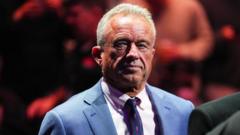As Robert F. Kennedy Jr. prepares for a role in Trump's administration, he aims to tackle America's food industry by banning ultra-processed foods and addressing harmful additives. His controversial history raises questions about the feasibility and scientific basis of his proposed reforms, leading to a divided reception among health experts and policymakers.
RFK Jr. Aims to Revolutionize America's Diet amidst Controversy

RFK Jr. Aims to Revolutionize America's Diet amidst Controversy
Robert F. Kennedy Jr., nominated to lead the Department of Health and Human Services, expresses a commitment to eliminate ultra-processed foods and improve dietary health, igniting both support and skepticism.
Robert F. Kennedy Jr. has quickly emerged as a focal point in discussions about America's dietary health following his nomination to head the Department of Health and Human Services (DHHS) under President-elect Donald Trump. Renowned for his outspoken views against prevalent food additives and ultra-processed foods, Kennedy’s mission resonates with an increasing cohort of health-conscious consumers who advocate for reform.
At a recent rally, Kennedy highlighted the dangers posed by food products enriched with harmful ingredients, referencing everything from artificial dyes found in breakfast cereals to unsaturated fats common in fast-food items. “We are betraying our children by letting [food] industries poison them,” he proclaimed, stirring a call for action against the overpowering presence of junk food in American diets.
However, Kennedy's ambitions may run into significant obstacles as he addresses the broader implications of food regulation. “What he's suggesting is taking on the food industry,” commented former NYU nutrition professor Marion Nestle. With skepticism regarding his possible backing by Trump, many experts are cautious about Kennedy’s capacity to incite meaningful regulatory change against Big Food.
A controversial figure due to his history of unfounded health claims, including debunked theories linking vaccines to autism, Kennedy's nomination raises eyebrows across various political spectrums. Notably, Colorado’s Democratic Governor Jared Polis has expressed tentative support for Kennedy's agenda, suggesting that his work could invigorate health policies at the FDA, despite outlining that scientific evidence must remain central to any health reforms.
Kennedy’s proposal to remove harmful additives aligns with a growing movement for healthier living. His initiatives aim to eradicate ultra-processed foods, which he links to numerous chronic diseases such as diabetes and cancer, a sentiment echoed by other public health experts. Yet, skepticism abounds regarding the feasibility of these goals. Experts assert that tackling the complexities of food regulation goes beyond surface-level rhetoric.
The approach to eliminate food dyes like Red No. 3 faces scrutiny, as critics warn of unintended consequences stemming from radically altering food safety regulations. Moreover, proposals to ban fluoride from drinking water and raw milk advocacy have raised alarm over public health risks. Some health authorities argue that such proposals lack scientific support and could lead to higher rates of illnesses.
As Kennedy navigates through the intricate overlap of FDA and USDA jurisdiction, it becomes evident that his bold statements could draw opposition from industries typically accustomed to limited oversight from both Republican and Democratic administrations. With many expecting industry pushback during his confirmation, navigating the political landscape could prove challenging.
Skepticism persists over Kennedy’s credentials to lead substantive change in America’s food culture. Critics argue that while initiating a dialogue about dietary reform is essential, Kennedy’s previous associations with misinformation could tarnish this endeavor. Addressing chronic disease risks and food safety remains a complex issue that demands cooperation across multiple domains of government.
In conclusion, while RFK Jr. may spark crucial conversations about America's dietary habits, the extent to which he can influence actual policy remains uncertain. The looming confirmation process and the pushback from established food industries illustrate the formidable journey ahead for turning his health-focused vision into reality.




















